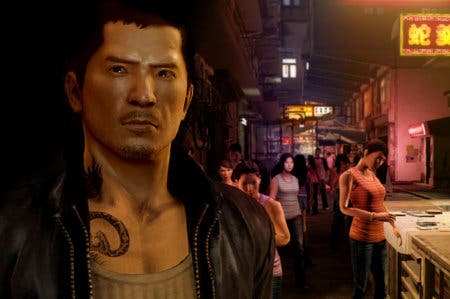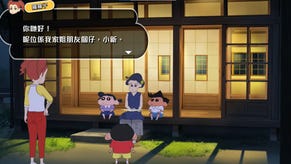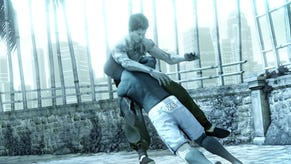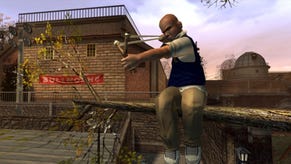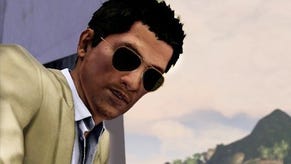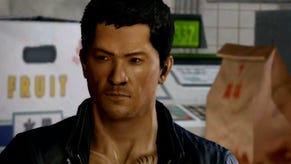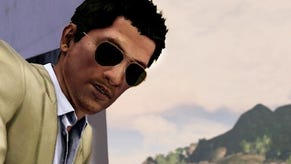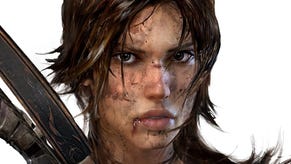Sleeping Dogs Preview: A True Open World Contender?
Wouldn't let it lie.
"Even our most optimistic internal projections show that continued investment was not going to lead to a title at, or near, the top of the competitive open world genre.
"In an industry where only the best games in each category are flourishing, to be blunt, it just wasn't going to be good enough."
Ouch. Activision CEO Eric Hirschberg didn't pull any punches when explaining the reason the publisher pulled the plug on True Crime: Hong Kong last February.
Games get canned all the time, of course, often before their existence is even shared with the world. To come so far and to be dismissed so brutally, then, must have come as a particular savage blow to United Front Games after its years of toil on a dream project.
Games are cancelled, studios close, jobs are lost. We read the headlines all too frequently and our hearts sink even as our heads, reluctantly, understand. While Activision is all-too-easily cast as the villain of this little piece, few expected a hero to emerge and save the day.
And yet that's exactly what Square-Enix did, reviving the project's still-warm corpse a few months later, breathing new life into an ailing, demoralised team that could, to its amazement, have a second crack at realising its vision.
"It's hard for me to say why they dropped it, but I can tell you why we signed it," says Lee Singleton, who heads up Square's London studio, which is overseeing development of the game now called Sleeping Dogs (as Square didn't pick up the rights to the name).
"We've got a lot of experience of making open world games, so we know the development pattern for games like that is a little bit different to the traditional model in that you go quite a long time before you see the true value of everything. It all comes together very late in the process.
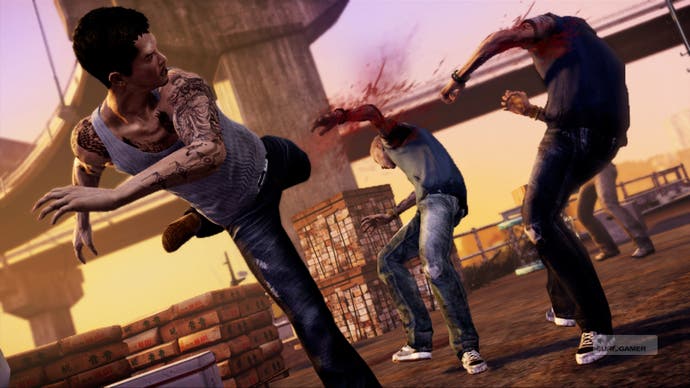
"When we looked at the game, it was just starting to come together. Perhaps they couldn't see when it had come together, I don't know. What we saw we really liked, and we could see the potential."
You'd forgive the developer for a concentrated dose of bitterness towards its former publisher, but it really does seem a genuine case of "no hard feelings" and "that's business".
"You put so much hard work, effort and time into something and to see it all stop, it's very difficult to deal with," admits Stephen Van Der Mescht, exec producer at United Front Games.
"Strategically, they wanted something they believed could be right at the top of the open world genre and we knew we needed to take a little bit more time to get there."
Singleton is more blunt about the state of the game when he picked it up: "If we were to squint, we could kind of see what was coming and it was about working together to polish and iterate - and giving the guys the time they need to do that."
If a major publisher's act of faith hasn't warmed your cockles enough, consider this: "Even people we had to let go at the time the project was cancelled, probably 90 per cent we asked to come back and they came back," reveals Van Der Mescht.
"They were willing to leave other jobs to come back and finish this project. That's how much it meant to them." Truly, a United Front.
Sleeping Dogs' greatest asset is its setting. Hong Kong is a place where east meets west with a bump, since Britain handed the region over to China in 1997. The city soars upwards, many of its residents crammed into the world's tallest residential buildings, while its grandest architectural monuments pulsate in neon after dark along the mesmerising harbour.

Sleeping Dogs is a crime story inspired by the cinema of the region. It's a classic undercover cop story, in which detective Wei Shen infiltrates the Triads, with the unfolding drama focused on what is the true cost of maintaining this cover.
As a game, it is unmistakably and heavily indebted to Grand Theft Auto in structure: an open-world adventure with a main narrative thread, multiple side missions and sideshows, vehicles to hijack, pedestrians to bother, criminals to bludgeon.
The influence is profound, from rising in your own apartment, and switching clothes in a wardrobe, to retrieving a favourite vehicle from the garage down below and setting off into the city.
Excitingly fresh setting aside, United Front and Square highlight the mechanics as a key differentiator, in particular its Batman Arkham Asylum-esque melee combat. In gang fights, blows can be strung together into smooth combos, with symbols appearing above the heads of enemies about to strike, who (in a nod to Batman) can then be countered to maintain the assault.
By far the most enjoyable aspect of combat is environment kills. Grab an enemy during a squabble and look for something glowing red. Drag them over to that and you can carry out one of many uniquely gruesome, fabulously satisfying takedowns.
Those I experience myself include: forcing a baddie's head onto a hotplate, which then catches fire; slamming a security shutter down into someone's face; forcing a head into an industrial fan; shoving another into a phone booth, then smashing the receiver repeatedly into their skull; shutting fridge doors onto faces; stuffing heads down toilets. You get the idea.
As gloriously gratuitous as these are, they could get old very quickly on endless repeat - but United Front insists there are "dozens and dozens" to exploit throughout the game.
The studio wants it key missions to play out like mini-action movies in themselves, seamlessly blending various gameplay types. An example involves tracking down a small time criminal called Johnny Ratface.
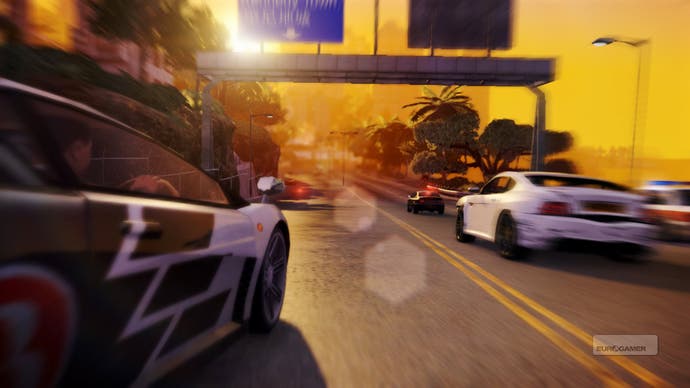
First using a mobile to contact him using a false identity, the device simultaneously triangulates his position by scanning and tracing the signal.
A journey to the docks ensues, with an outdoor fistfight (environmental kills include chucking someone into the sea and crunching another's head in a car bonnet), segueing into a cover-and-shoot gun battle inside a warehouse.
Shen has a neat manouevre activated by running at an obstacle to slide over it. The action switches to bullet time, with heads exploding theatrically left and right with the help of a good aim. And if triggers aren't your thing, there's always the trusty old machete. Squelch.
From here, Shen jumps on a bike in pursuit of Ratface's escaping car, blasting enemy-filled vehicles from his path, which burst into flames and pirouette absurdly through the air. Get close enough and it's time for an Action Hijack, where Shen leaps inside the target car to seize control as the missions builds to its gory conclusion.
Beyond the main narrative, United Front promises a wealth of additional content. Triad Wars side-missions, Hangouts to conquer, smart car racing, cockfighting and even karaoke. What it lacks in originality, therefore, the developer hopes to make up for through generosity.
Getting hands-on with the game in Hong Kong, the assembled press are warned that it's an alpha build, and that there will be glitches. And indeed there are. There's a notable lack of smoothness to the busier action sequences, where the framerate frequently plunges, while pop-in is very apparent at speed in a vehicle.
Police have curiously been switched off for the demo, so I spend many a happy minute attacking pedestrians at random with little comeback. NPCs are nicely animated, with an almost surreal quality to passers-by that makes them stand out against the urban sprawl.
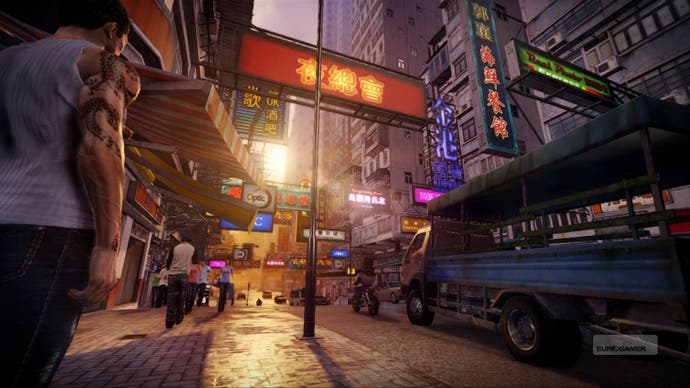
During proper fights, the AI is set to "dumb" and clearly needs turning up a few notches to add an element of peril and purpose to the proceedings.
Balance, balance, balance. Widening a road here, reducing the pedestrian density there - these are the things open world developers lose sleep over, the smallest changes with the biggest impact, good and bad.
We're also told during one of the playable missions not to explore the open-world at all and stick closely to the mission structure.
All of which suggests there's still a lot of work to be done to smooth out the rough edges. But, as Square would probably point out, of all the genres in gaming, open-world is always the last to come together.
Having salvaged the project from the scrapheap, Square is hardly going to kick the game out of the door unfinished. But with a release pencilled in for the second half of 2012, there's clearly plenty to keep the studio busy.
And that's without the added distraction of a certain Grand Theft Auto 5, which may well end up launching before Christmas, eclipsing everything else in sight.
"Obviously we don't want to ship against those guys," says Singleton. "We'd like distance between the two, but I think there's room in the market for both of them. There's not tonnes and tonnes of open world games."
Sleeping Dogs has become an uplifting story of triumph over adversity and the gift of a second chance. The pressure is now on United Front Games to show us it has a happy ending, too.
